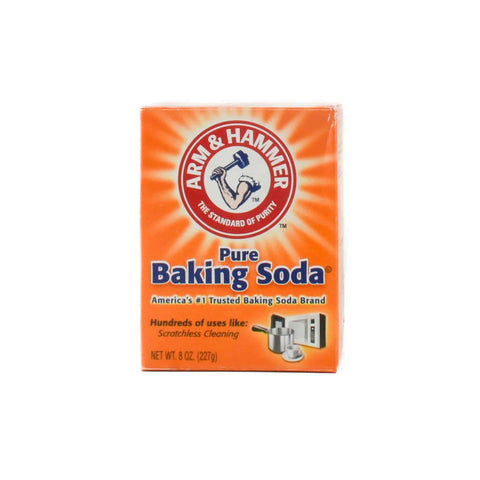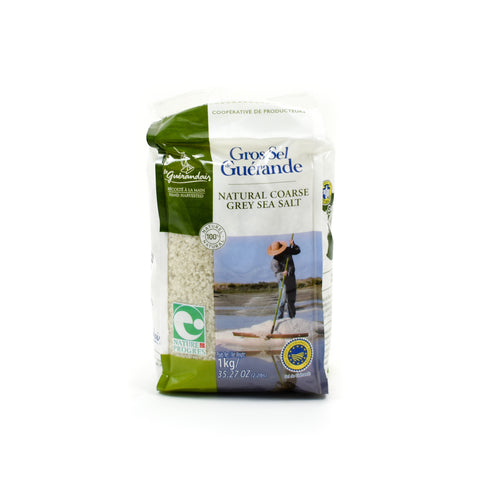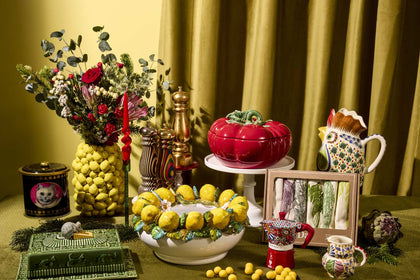How To Remove Rust From Cast Iron Pan
by Kristin Lohse

Cast iron cookware can rust. But you can also clean the rust away, and restore almost any pan back to its original condition. So even the worst-cases of rusty cast iron can often be rectified. In this guide, we’ll explain exactly how.
We’ll cover these cleaning methods for removing rust from cast iron:
Sous Chef’s Cast Iron expert Kristin Lohse is our cookware buyer. She has many years of experience using, testing and cooking with a huge breadth of pots and pans. She shares her expertise from her career looking for the very best cast iron pans.
Become a cast iron expert, with our ultimate guide to cast iron pans. And browse all cast iron cookware at Sous Chef.
Are brown spots on cast iron rust?
Is it rust? Not always. Brown spots on cast iron pans can be a sign of seasoning buildup or food residue. They appear when oil or food isn't evenly distributed. Over time, these spots darken, resembling rust.
If the spots are flaky and feel rough, it's likely rust. Rust forms when cast iron is exposed to water for too long. If the spots are smooth, it's probably just seasoning.
To address rust, clean the area with a mixture of water and mild detergent. Scrub gently with a non-metal brush. For stubborn rust, use fine-grit sandpaper or metal scouring pad. Cast iron pans are very robust and can take this level of cleaning if needed. They will just need reseasoning after such thorough cleaning.
For seasoning buildup, heat the pan and apply a thin layer of oil. This evens out the surface. Regular maintenance prevents both issues. After use, wash, dry, and lightly oil your pan before storing. This keeps your cast iron in top condition, free from rust and uneven seasoning.
READ: how to clean your cast iron pans
What is the easiest way to remove rust from cast iron pans?

Removing rust from cast iron pans can seem daunting, but it doesn’t have to be. The fastest way to remove rust is simple and effective, requiring common household items.
- Start by scrubbing the rusty areas with steel wool or a stiff brush. This step helps to remove surface rust effectively.
- After scrubbing, wash the pan with warm, soapy water. This removes any loose rust and debris. Rinse thoroughly afterward. For stubborn rust spots, create a paste of equal parts water and baking soda. Apply this directly to the rusted areas and let it sit for a few minutes before scrubbing again.
- Once the rust is removed, dry the pan completely. It’s important to prevent moisture from sitting on the cast iron, as this can lead to more rust. Use a clean towel or place the pan on a stove over low heat to ensure it’s thoroughly dry.
- The next step is crucial: reseasoning the pan. Apply a thin layer of vegetable oil all over the pan, inside and out. Place it upside down in a preheated oven at 250°C for about an hour. This process replenishes the protective coating that prevents rust and creates a non-stick surface.
Kristin says: “Oil for seasoning HAS to be a high smoke point oil. Like vegetable oil, sunflower oil or grapeseed oil. DO NOT USE OLIVE OIL. Some companies also do a flaxseed oil for seasoning (like Netherton Foundry). Which is food safe, but not normally used for cooking.”
- Regular maintenance is key to avoiding rust in the future. Always dry your cast iron pan immediately after washing and apply a light coat of oil before storing. This routine keeps your pan in top condition, ready for your next cooking adventure.
Does salt remove rust from cast iron?
Yes, salt can help remove rust from cast iron. It's a gentle, effective method. Salt acts as an abrasive, scrubbing away the rust without damaging the pan's surface. Kristin adds: “This is my preferred method for rust removal”. Here's how to do it:
- Sprinkle a generous amount of coarse salt over the rusted areas. Cut a potato in half and use it as a scrubber. The moisture from the potato combined with the salt creates a natural abrasive paste. This mixture helps lift rust from the pan.
- After scrubbing, rinse the pan with water to remove any salt residue. It's important to dry the pan immediately and thoroughly. Heat it on the stove to ensure all moisture evaporates.
- Next, you must re-season the pan. Apply a thin layer of oil and heat it in the oven. This process restores the protective coating that prevents rust.
How to remove rust from cast iron pan with vinegar
Rust on a cast iron pan is not the end. You can save it easily. The method? Simple. Kristin explains: “I would use this method if the entire pan has a lot of rust on it. If it's just spots here or there, I'd use one of the other methods instead.”
- Use white vinegar and water. Mix them equally.
- Soak the pan. But watch it closely. Too long in vinegar can harm the iron. Aim for an hour, then check. The rust should start to loosen.
- Scrub it off gently with a scouring pad.
- For tough spots, a paste of baking soda and water helps. Rinse the pan well after scrubbing.
- Now, dry it thoroughly. Use your stove to heat it up and evaporate all moisture.
TOP TIP: A combination of baking soda and vinegar can be effective for rust removal. The reaction between baking soda and vinegar produces a gentle fizzing action that helps lift rust from the pan's surface. Apply the mixture to the rusted areas and let it sit for a few minutes before scrubbing. As with the baking soda paste, it’s vital to rinse the pan well and dry it completely after treatment.
Baking soda, alone or with vinegar, is a safe and effective way to remove rust from cast iron pans. It’s a non-toxic option that won’t harm the pan if used properly. After removing rust, remember to season your pan with oil and bake it to restore its non-stick surface. This treatment not only removes rust but also prevents it from returning, keeping your cast iron in excellent condition for years to come.
Does baking soda remove rust from cast iron?

Baking soda is a versatile ingredient in the kitchen, not just for cooking but also for cleaning, including removing rust from cast iron pans. To remove rust from a cast iron pan with baking soda:
- start by making a paste using baking soda and a little water.
- Apply this paste directly onto the rusted areas of the pan and let it sit for a few minutes.
- Using a scrubbing pad or brush, gently scrub the paste into the rusted spots. You'll notice the rust starting to lift away from the pan.
- After scrubbing, rinse the pan thoroughly with warm water to remove any remaining paste and loosened rust particles.
- It's important to dry the pan completely after rinsing to prevent new rust from forming.
- Always season your pan again after scrubbing away rust, because you're exposing part of the iron - and that makes the pan more susceptible to rust again in that area.
Does baking soda damage cast iron?
Does baking soda damage cast iron? When used correctly, baking soda does not damage cast iron. It’s a mild abrasive, which means it's tough on rust but gentle on the pan's surface. However, it’s crucial to thoroughly rinse and dry the pan after using baking soda to ensure no residue is left behind.
Will lemon juice remove rust from cast iron?
Lemon juice can help remove rust from cast iron, thanks to its citric acid content. This natural acid reacts with rust (iron oxide), breaking it down and making it easier to scrub off. It's a mild, eco-friendly method compared to harsh chemicals.
Here’s how to use it:
- Squeeze lemon juice onto the rusted areas of your cast iron pan. For extra effectiveness, sprinkle some salt over the juice.
- Salt acts as an abrasive, aiding in the rust removal process. Let the mixture sit for a couple of hours. The acid works to loosen the rust during this time.
- After soaking, scrub the area with a brush or sponge. You’ll notice the rust coming off.
- Once the rust is removed, wash the pan with water and mild soap. Then, dry it immediately and thoroughly to prevent new rust from forming.
- Use a towel first, then place it on a stove over low heat to ensure it's completely dry.
- Finally, re-season your pan. Apply a thin layer of oil and bake it in the oven. This process restores the protective layer that prevents rust and ensures a non-stick surface.
While lemon juice is effective for light rust, more severe cases might require additional treatments. Remember, after using lemon juice, re-seasoning your cast iron is essential to maintain its condition and functionality.
Is a little rust on cast iron OK?
A rusted cast-iron pan is not ruined. But you do definitely need to remove the rust, before you cook with your pan. Small amounts of rust can be easily treated and the pan restored to its original condition.
The key is to address the rust as soon as you notice it. This prevents the rust from penetrating deeper into the pan, making it harder to remove.
How do you remove rust from enamel cast iron
Enamelled cast iron, like Le Creuset, won't rust and also doesn't need seasoning. Hence the benefits of less maintenance. But you don't get the benefit of the natural non-stick you get with other cast iron.
Enamelled cast iron like Le Creuset would only rust with the enamel has chipped away, exposing the iron underneath. If this has happened, you may need to consider getting your pan re-enamelled as well.
But in order to remove any rust in these instances, this is how to do it:
- Start by mixing a solution of warm water and mild dish soap.
- Use this to clean the surface, focusing on any rusty areas.
- If the rust persists, apply a paste made from baking soda and water directly to the spots. The paste should sit for a few minutes to loosen the rust.
After removing the rust, it’s crucial to protect the surface. Apply a small amount of cooking oil to a paper towel and rub it over the enamel to create a protective barrier.
It’s important not to use harsh abrasives or steel wool on enamel cast iron, as these can scratch or damage the surface further.
How to remove heavy rust from cast iron
Heavy rust on cast iron might seem daunting. But, it's fixable. Start by assessing the rust level. Is it surface-level or deeper? For deep rust, you need a more thorough approach.
- First, you'll need steel wool or a wire brush. This tackles heavy rust effectively. Wear gloves to protect your hands.
- Scrub the pan's surface. Your goal is to remove as much rust as possible. You won't damage cast iron by scrubbing it with steel wool or a wire brush. You'll expose more of the metal, but you just need to reseason it, maybe a couple of times, to restore it.
- After scrubbing, wash the pan with warm, soapy water. This step removes loosened rust particles.
- Rinse it well under running water. Then, it's crucial to dry the pan immediately. Use a clean towel or heat it on the stove to ensure all moisture evaporates.
- Next, reseason the pan. Seasoning protects the pan from future rust.
- Maintenance, always dry your pan thoroughly after washing. Store it in a dry place. If you spot any moisture, heat the pan to dry it out before storing. This prevents rust from returning.
Remember, rescuing a heavily rusted cast iron pan is possible. It requires effort but extends the life of your cookware. Plus, it maintains the non-stick surface essential for cooking.
Why does my cast iron keep rusting?
Cast iron rusts when exposed to moisture. It's that simple. The reason your pan keeps rusting could be how you're cleaning or storing it. Let's explore some common causes.
- First, drying. Using too much water or leaving your pan wet after washing is a mistake. Always dry your pan thoroughly and don’t leave it to dry on the rack. After washing, you may want to heat it on the stove. This evaporates any lingering moisture. But at the very least, towel dry completely before storing.
- Second, storage matters. Keep your pan in a dry place. Humidity is the enemy. A pan left on a damp countertop or in a moist environment will likely rust. Kristin adds: “Be mindful of stacking other pans on top or underneath your cast iron pan that might not be completely dry and drip water onto the cast iron, causing it to rust.”
- Third, seasoning is crucial. A well-seasoned pan has a protective layer that fights rust. If this layer wears off, rust can take hold. Season your pan regularly. After cleaning, apply a thin oil layer. Heat it in the oven to reinforce the seasoning. “The more well seasoned a pan is, the less susceptible it is to rust”, says Kristin.
Address these areas, and you'll see less rust. Regular care keeps your cast iron in prime condition. Remember, a little attention goes a long way.
How do I know if my cast-iron pan is ruined?
“It's quite difficult to completely ruin a cast iron pan. Such extensive damage that it can't be saved would likely be caused by it being left outside in rain etc for very long periods of time (like weeks or months). I've seen 30 year old pans, completely covered in rust be fully restored, seasoned and working fantastically again. So it's unlikely that you'll end up with a cast iron pan that is beyond saving.” says Kristin.
What does a ruined cast-iron pan look like? Beyond surface rust, look for warping. A pan that doesn't sit flat on the stove due to high heat exposure might not cook evenly, but it's not necessarily ruined unless it affects your cooking significantly. Cracks are more serious. Even small cracks can grow, making the pan unsafe for use. They can't be repaired and signal it's time for a new pan.
Deep pitting from rust, where the surface has corroded significantly, compromises the integrity of the pan. While minor pitting can be sanded down and re-seasoned, extensive pitting reduces the pan's lifespan and cooking efficiency.
Remember, most issues with cast iron are fixable with cleaning and seasoning. Only in cases of cracks, holes, or severe warping is the pan truly ruined. Cast iron is resilient, often lasting generations with proper care.
Looking to expand your cast iron collection? Read our buyer’s guide on cast iron pan first. It includes everything you need to know about cast iron cookware, including the best brands to buy and how to care for your pans to ensure they last forever.
Our recommendations to remove rust from Cast Iron Pans:
Arm & Hammer baking soda has developed something of a cult following – with a string of esoteric uses to rival even duct tape. The baking soda can be used to unclog a drain, and scrub clean casserole pans.
This coarse grey sea salt is hand-harvested by salt workers in Brittany, using skills and a method that are over a thousand years old.

About the author
Kristin is the Purchasing and Buying assistant at Sous Chef. She has several chefs and excellent home cooks in her family, and grew up in the kitchen in Sweden. Cooking and baking with her mum happened pretty much every day. Cinnamon rolls were always stocked up in the freezer, and if they were running low, more baking had to be done. Kristin always loves learning more about food and ingredients to continue improving her skills.




